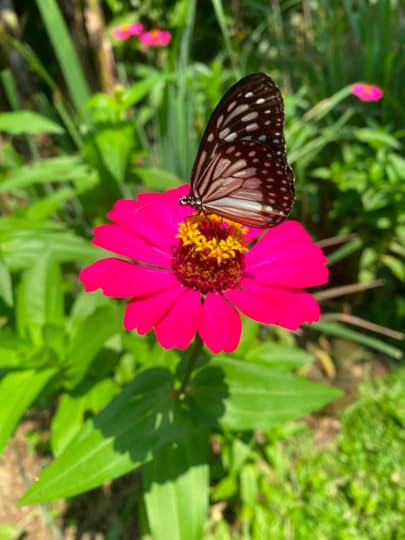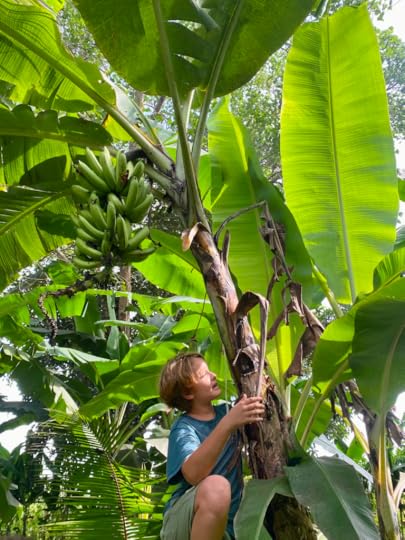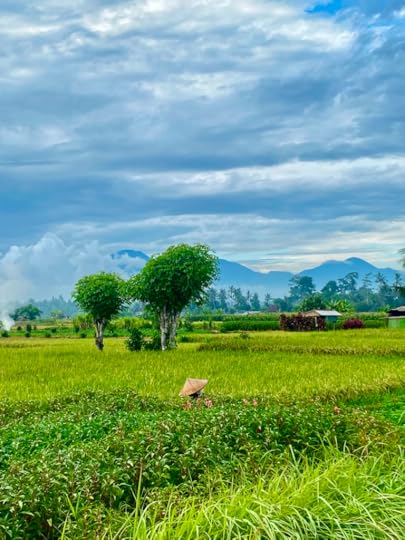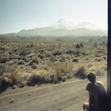Slowing down can be a way of rewilding yourself
Life lately for me has been taking place in the slow lane.
It is not easy for me to slow down. I always have a thousand projects and ideas for writing, research, new designs, collaborations, etc. etc. And all of that noise tends to be mixed with piles of books I would like to read, music I want to re(listen) to (I am trying to slowly go through my record collection, reliving why I bought each record), and plants I want to try to grow in my garden (and as this whole gardening thing is 100% learning by doing, there are lots of trials and frustrating errors!).
 One of the many beautiful butterflies in my garden
One of the many beautiful butterflies in my gardenBut, slowing down is important. Most of us can agree to that. So, why can it be so hard?
Perhaps one of the reasons is that when we slow down, we don’t feel productive. And in a result-focused, growth-obsessed time era like ours that can be hard.
However, I have discovered that when I allow (or force!) myself to slow down something interesting happens. And that is: I get novel ideas that take my research to places I hadn’t gotten to if I had pushed myself to study for hour upon hour, I meet people and form connections I otherwise wouldn’t have — and these lead to talks that inspire me and create new fruitful opportunities, I experience nature as a part of me and get deeply nourished by the natural environment around me, and I am much more focused and calmer when I engage in problem solving.
Furthermore, my garden really likes it when I am slow and calm; the plants thrive on slowness.
Slowing down has become my way of rewilding myself.
 My son cutting down bananas in our garden
My son cutting down bananas in our gardenI recently read up on French philosopher Jean-Jacques Rousseau’s (1712–1778) philosophy, and in particular his seminal Emile, or On Education (1762). In short, the philosophical explorations of Emile revolve around the boy Emile, who is taken away from society by his teacher in order to let the natural course of development take place (and without being disrupted by society and cultivation). Rousseau’s mission was to explore an educational system that allows for what he calls the natural man to develop without being corrupted by society.
Rousseau pleaded for children to be children rather than small adults. Until children are 12 years old, they should run around and not sit by a desk, he thought. Rather, they should be outside and learn from nature, and do so without science textbooks (which in his opinion would be considered negative education, at that stage of children’s development). The child is a natural learner, and so, (s)he should be encouraged to cultivate that innate ability and inborn curiosity.
And so, in order to fulfill this dream, Emile is kept away from society by his tutor. Only as a teenager is he introduced to citizenship. This is done in order to ensure that the essence of early-stage education is characterized by free exploration; by play and by slow exploration of nature.
 My neighbouring farmer
My neighbouring farmerRousseau’s core-belief was that in order to live a happy life (or a life worth sustaining) one should leave the city and live in a natural environment. He envisioned small, harmonious, self-sufficient communities in sync with the local environment and nature. In a sense one could argue that he was a forerunner for the slow living movement as well as for locally grown, sourced produce. He would most certainly have been against big global chains and the homogenization and sameness that such entities enthrall.
The plea in Emile holds a bit of Thoreauvian into-the-wild-ness.
American essayist and philosopher Henry David Thoreau (1817–1862) wrote Walden: Or, Life in the Woods in 1854. The book revolves around him leaving society and wandering into the woods, building a cabin on his own, and staying there for two years, two months, and two days (what a statement, right?).
In the forest near Walden Pond, Massachusetts he spent his time reflecting on how to live a good, fulfilling, non-materialistic, and self-sufficient life. As Thoreau states in the beginning of the book:
”I went to the woods because I wished to live deliberately, to front only the essential facts of life, and see if I could not learn what it had to teach, and not, when I came to die, discover that I had not lived.”
The Rosseauean idea of society corrupting us and misleading us seeps through this. That in order to live natural, authentic, fulfilling lives (that we can sustain and justify) we must leave society, turn our backs on civilization and engage in an (slow) uncultivated way of life in close connection with nature, if only for a while. It is the idea that we cannot as a part of society be fully free and creative.
However, while Rousseau discusses the education of the child (the uncultivated mind and soul), Thoreau focuses on rewilding the cultivated, civilized adult. The undoing of the harm of civilization can be done, but it requires a withdrawal, it requires a conscious move away from society and back into the wild.
I guess Rousseau would argue that a more applicable way would be not to get there in the first place: to ensure through the upbringing and education of children that they are equipped to live as a natural being within society; to reinforce instead of reverse, to prevent instead of cure.
Maybe that would also make it easier to slow down.
Cover art by Lene Refsgaard



